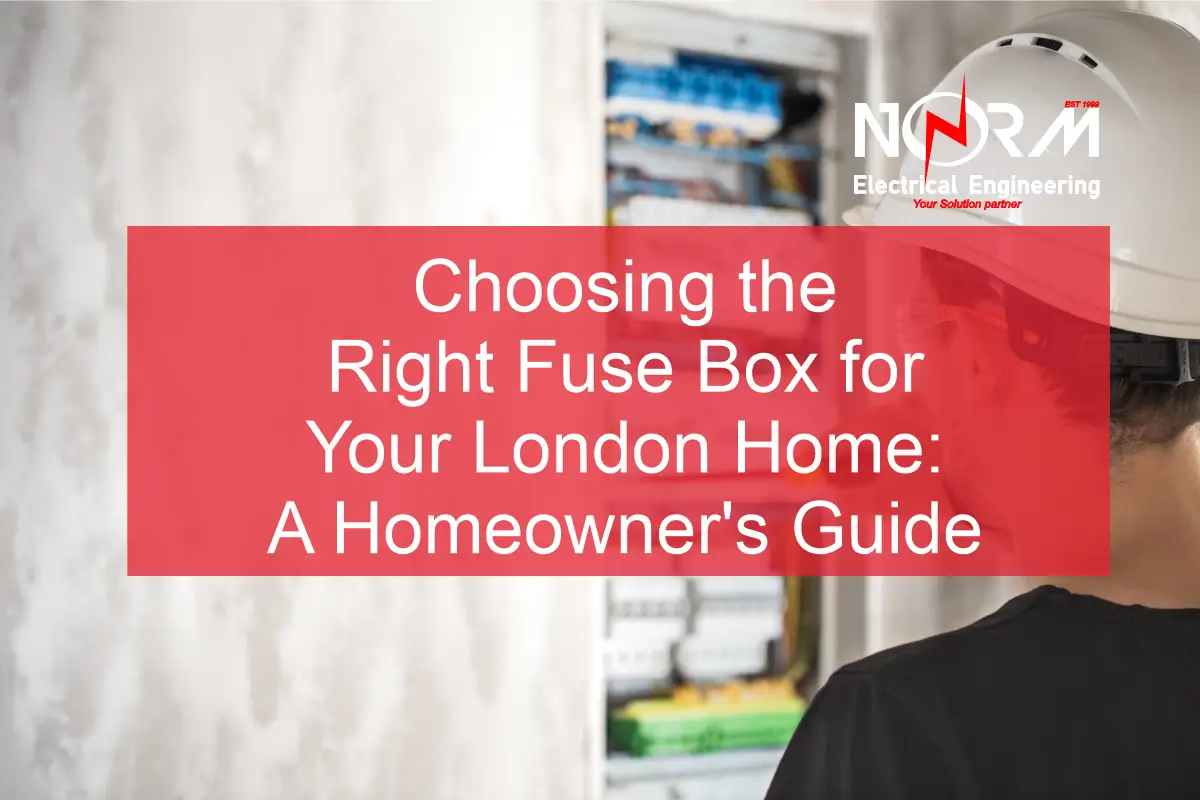Choosing the Right Fuse Box for Your London Home: A Homeowner’s Guide
When it comes to the safety and functionality of your home’s electrical system, the fuse box—also known as the consumer unit—is one of the most crucial components. It is responsible for distributing electricity to the various circuits throughout your home, ensuring each area receives the appropriate power, and protecting the system from overloads or faults. Whether you’re moving into a new property, upgrading an older system, or simply replacing a faulty fuse box, choosing the right fuse box for your London home is an important decision.
This comprehensive guide will walk you through everything you need to know about choosing the right fuse box for your London home, from understanding the key components of a fuse box to selecting the correct model and ensuring it meets current safety standards. We will also highlight the importance of working with a professional electrician, explore how fuse boxes can enhance the safety and efficiency of your home, and provide useful information on costs, regulations, and common mistakes to avoid. Additionally, we will explain how Norm Electrical Engineering can help you make an informed decision about your fuse box upgrade.
Table of Contents
What is a Fuse Box and Why is it Important?
Key Components of a Fuse Box
2.1 Fuse or Circuit Breaker
2.2 Residual Current Device (RCD)
2.3 MCB (Miniature Circuit Breaker)
2.4 RCD and MCB Combo
Types of Fuse Boxes
3.1 Traditional Fuse Box
3.2 Modern Fuse Box with Circuit Breakers
3.3 Fuse Boxes with RCD Protection
3.4 Smart Fuse Boxes
How to Choose the Right Fuse Box for Your Home
4.1 Assessing Your Home’s Electrical Needs
4.2 Compliance with Current Building Regulations
4.3 The Size of the Fuse Box
4.4 Choosing Between Single or Dual RCD Units
Common Mistakes Homeowners Make When Choosing a Fuse Box
The Importance of Hiring a Professional Electrician
The Cost of Fuse Box Upgrades in London
7.1 Factors Affecting the Cost
7.2 Typical Prices for Fuse Box Upgrades
Fuse Box Installation: What You Need to Know
Legal Requirements for Fuse Box Installations in the UK
9.1 Part P of the Building Regulations
9.2 BS 7671 Wiring Regulations
How Norm Electrical Engineering Can Help
Conclusion: Making the Right Decision for Your Home’s Electrical Safety
1. What is a Fuse Box and Why is it Important?
The fuse box, or consumer unit, is an integral part of your home’s electrical system. It’s responsible for distributing electricity safely to various circuits within your property and protecting the system from potential electrical faults. If you experience an electrical surge, overload, or fault, the fuse box automatically shuts down the power to prevent fire hazards, electrical shocks, and other risks.
Over time, fuse boxes can become outdated or inadequate for modern electrical demands, especially as the number of devices and appliances in the home increases. Choosing the right fuse box ensures that your home is equipped to handle the electrical load, meets current safety standards, and provides maximum protection for both your family and property.
2. Key Components of a Fuse Box
To choose the right fuse box for your home, it’s important to understand the key components that make up the unit:
2.1 Fuse or Circuit Breaker
The fuse or circuit breaker is the primary protection element in the fuse box. If an overload or short circuit occurs, the fuse or circuit breaker automatically trips, cutting off the power to prevent further damage. Modern systems often use circuit breakers, which can be reset after tripping, as opposed to fuses, which must be replaced.
2.2 Residual Current Device (RCD)
An RCD is an essential safety feature that detects any imbalance in the electrical current between live and neutral wires. If the RCD detects leakage current, such as in the event of an electrical fault or human contact with an electrical device, it will quickly shut off the power. This is crucial for preventing electrocution and electrical fires.
2.3 MCB (Miniature Circuit Breaker)
An MCB is designed to protect individual circuits from overloading or short circuits. It automatically disconnects the power when an overload or fault is detected. MCBs are essential for ensuring that each circuit in your home is adequately protected.
2.4 RCD and MCB Combo
Modern fuse boxes often incorporate both RCD and MCB protections in one unit. This combination provides comprehensive protection for both individual circuits and the overall system, ensuring that your home is safe from electrical faults.
3. Types of Fuse Boxes
Choosing the right type of fuse box for your London home depends on various factors, such as your electrical requirements, budget, and safety preferences. Below are some common types of fuse boxes:
3.1 Traditional Fuse Box
Older homes may still have traditional fuse boxes, which rely on fuses rather than circuit breakers. While these systems can still function, they lack modern safety features like RCDs and MCBs, which provide better protection. For homes with outdated fuse boxes, upgrading to a more modern system is highly recommended.
3.2 Modern Fuse Box with Circuit Breakers
Modern fuse boxes typically use circuit breakers instead of fuses. These units are more reliable, as they can be reset after tripping, rather than requiring fuse replacements. A modern fuse box with circuit breakers can better handle the increased load of modern appliances and devices.
3.3 Fuse Boxes with RCD Protection
Fuse boxes with integrated RCD protection are ideal for providing enhanced safety, especially in areas with high moisture levels, such as kitchens and bathrooms. RCDs are an essential feature for protecting against electrocution and electrical faults, making them a top choice for modern homes.
3.4 Smart Fuse Boxes
Smart fuse boxes are the latest innovation in electrical safety. These units can connect to your home’s Wi-Fi network and allow you to monitor and control your electrical system remotely. Smart fuse boxes can alert you to electrical faults and offer greater convenience for managing your home’s electrical system.
4. How to Choose the Right Fuse Box for Your Home
When selecting a fuse box for your London home, there are several factors you need to consider. Below are some key considerations to help you make an informed decision:
4.1 Assessing Your Home’s Electrical Needs
The first step in choosing the right fuse box is to assess your home’s electrical needs. Consider how many electrical circuits you have and whether you are planning any electrical upgrades or new installations, such as additional appliances, electric vehicles, or a smart home system.
If your home is older, it may require a higher-capacity fuse box to meet modern power demands. Similarly, if you’re planning to install more appliances or upgrade your electrical system, you may need a larger or more advanced fuse box.
4.2 Compliance with Current Building Regulations
Fuse boxes must comply with current Building Regulations in the UK, including the 18th Edition of the IET Wiring Regulations (BS 7671) and Part P of the Building Regulations. Ensure that any fuse box you choose meets these standards for safety and functionality.
Helpful Resource: Electrical Safety Standards – gov.uk
4.3 The Size of the Fuse Box
When selecting a fuse box, consider the size of your home and the number of circuits that need to be protected. Larger homes with multiple electrical circuits require a larger fuse box with more circuit breakers and RCDs to handle the increased load. In smaller homes or flats, a more compact unit may suffice.
4.4 Choosing Between Single or Dual RCD Units
For enhanced safety, you may opt for a fuse box with dual RCD protection. This provides greater protection by separating high-risk circuits, such as those in bathrooms or kitchens, from the rest of the home. A dual RCD unit is ideal for homes with multiple electrical circuits or specific safety requirements.
5. Common Mistakes Homeowners Make When Choosing a Fuse Box
Choosing an Undersized Unit: Choosing a fuse box with insufficient capacity can result in overloading and potential safety hazards. Always choose a unit that matches the electrical load of your home.
Opting for Low-Cost, Low-Quality Units: While it’s tempting to save money, low-quality fuse boxes can pose significant safety risks. Always choose a reputable brand and ensure that the fuse box complies with current safety standards.
Overlooking Future Electrical Needs: Consider future electrical needs when selecting a fuse box. If you plan to add new appliances or upgrade your electrical system in the future, opt for a fuse box that can accommodate these changes.
6. The Importance of Hiring a Professional Electrician
Choosing the right fuse box is only the first step. To ensure that your new fuse box is installed correctly and safely, always hire a professional electrician. A qualified electrician will ensure that the installation complies with Building Regulations and BS 7671 Wiring Regulations, and they can offer expert advice on the best fuse box for your needs.
7. The Cost of Fuse Box Upgrades in London
The cost of upgrading your fuse box in London can vary depending on the size of the unit, the complexity of the installation, and the type of fuse box chosen. On average, homeowners can expect to pay between £350 and £1,500 for a full fuse box upgrade, including installation, testing, and certification.
Factors that affect cost include the number of circuits, the type of fuse box, and any rewiring that may be necessary.
8. Fuse Box Installation: What You Need to Know
Fuse box installation involves replacing the old unit with a new, safer system. The process typically includes inspecting the existing electrical system, selecting a suitable fuse box, rewiring circuits if necessary, and testing the new system to ensure it is working correctly. A professional electrician should handle all aspects of the installation.
9. Legal Requirements for Fuse Box Installations in the UK
In the UK, all electrical work, including fuse box upgrades and installations, must comply with Part P of the Building Regulations. This ensures that electrical systems are safe, reliable, and compliant with national safety standards.
Helpful Resource: Building Regulations – gov.uk
10. How Norm Electrical Engineering Can Help
At Norm Electrical Engineering, we specialize in providing expert fuse box upgrades and installations throughout London. Our team of certified electricians will assess your home’s electrical system, recommend the best fuse box for your needs, and ensure that the installation is completed to the highest safety standards.
For more information or to book a consultation, visit Norm Electrical Engineering or call us at 020 8245 8400 or 0772 430 8998.
11. Conclusion: Making the Right Decision for Your Home’s Electrical Safety
Choosing the right fuse box for your London home is a crucial decision that impacts the safety, efficiency, and functionality of your electrical system. By understanding the key components of a fuse box, considering your home’s electrical needs, and working with a professional electrician, you can ensure that your fuse box provides optimal protection and meets current regulations.
For expert guidance and fuse box installation in London, trust Norm Electrical Engineering to provide you with a reliable, safe, and cost-effective solution.









